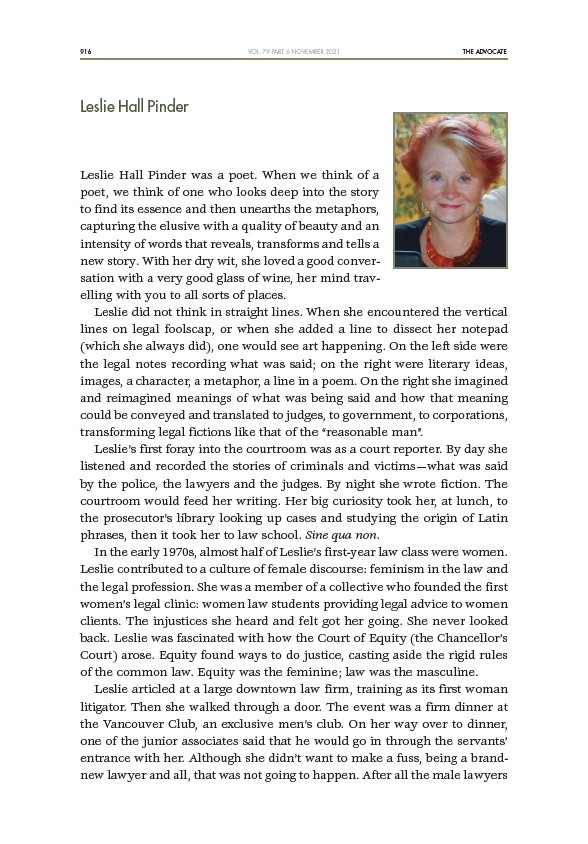
916 THE ADVOCATE
VOL. 79 PART 6 NOVEMBER 2021
Leslie Hall Pinder
Leslie Hall Pinder was a poet. When we think of a
poet, we think of one who looks deep into the story
to find its essence and then unearths the metaphors,
capturing the elusive with a quality of beauty and an
intensity of words that reveals, transforms and tells a
new story. With her dry wit, she loved a good conversation
with a very good glass of wine, her mind travelling
with you to all sorts of places.
Leslie did not think in straight lines. When she encountered the vertical
lines on legal foolscap, or when she added a line to dissect her notepad
(which she always did), one would see art happening. On the left side were
the legal notes recording what was said; on the right were literary ideas,
images, a character, a metaphor, a line in a poem. On the right she imagined
and reimagined meanings of what was being said and how that meaning
could be conveyed and translated to judges, to government, to corporations,
transforming legal fictions like that of the “reasonable man”.
Leslie’s first foray into the courtroom was as a court reporter. By day she
listened and recorded the stories of criminals and victims—what was said
by the police, the lawyers and the judges. By night she wrote fiction. The
courtroom would feed her writing. Her big curiosity took her, at lunch, to
the prosecutor’s library looking up cases and studying the origin of Latin
phrases, then it took her to law school. Sine qua non.
In the early 1970s, almost half of Leslie’s first-year law class were women.
Leslie contributed to a culture of female discourse: feminism in the law and
the legal profession. She was a member of a collective who founded the first
women’s legal clinic: women law students providing legal advice to women
clients. The injustices she heard and felt got her going. She never looked
back. Leslie was fascinated with how the Court of Equity (the Chancellor’s
Court) arose. Equity found ways to do justice, casting aside the rigid rules
of the common law. Equity was the feminine; law was the masculine.
Leslie articled at a large downtown law firm, training as its first woman
litigator. Then she walked through a door. The event was a firm dinner at
the Vancouver Club, an exclusive men’s club. On her way over to dinner,
one of the junior associates said that he would go in through the servants’
entrance with her. Although she didn’t want to make a fuss, being a brandnew
lawyer and all, that was not going to happen. After all the male lawyers